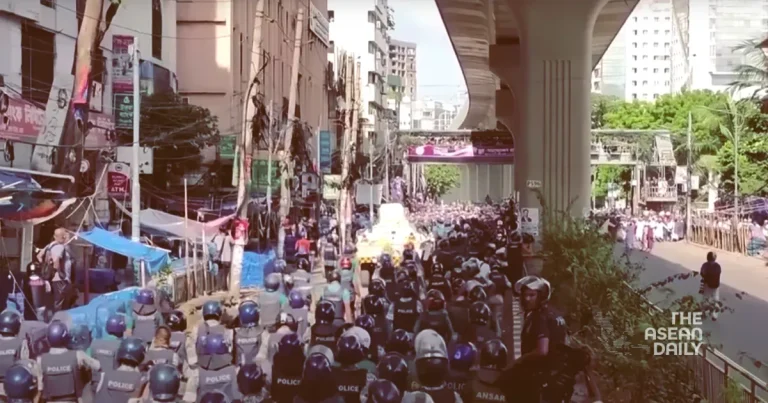20-7-2024 (DHAKA) Bangladesh’s capital city Dhaka transformed into a virtual military garrison as soldiers patrolled the deserted streets on Saturday (Jul 20), enforcing a strict curfew in the wake of deadly student-led protests that have rocked the nation. The government ordered all offices and institutions to remain shuttered for two days after at least 114 people were killed this week during demonstrations against the controversial job quota system.
The unrest, which has spiraled into the most severe crisis faced by Prime Minister Sheikh Hasina’s government since her re-election earlier this year, erupted following student anger over the quotas that reserve 30 percent of government jobs for the families of those who fought for independence from Pakistan. Despite Hasina’s administration scrapping the quota system in 2018, a court reinstated it last month, igniting nationwide protests fueled by high youth unemployment rates.
As the death toll climbed and security forces struggled to contain the widespread unrest, authorities imposed a nationwide curfew and deployed the military, granting them the authority to use lethal force if necessary. On Saturday, at least four more lives were lost during sporadic clashes in parts of Dhaka, the epicenter of the protests, according to hospital records.
In a bid to quell the escalating violence, the government declared Sunday and Monday as “public holidays,” with only emergency services allowed to operate. Universities and colleges had already been closed since Wednesday.
The demonstrations, the largest since Hasina’s re-election, have been exacerbated by the government’s decision to suspend internet and text message services across the country since Thursday, effectively cutting off communication channels for the nation’s nearly 170 million citizens.
#WATCH Soldiers patrolled the deserted streets of #Bangladesh‘s capital #Dhaka during a curfew meant to quell a student-led protests against government job quotas that have killed at least 110 people this weekpic.twitter.com/ut3ONTiTVE
— MDWLive! News (@MDWLiveFeed) July 20, 2024
“To take a country of nearly 170 million people off the Internet is a drastic step, one we haven’t seen since the likes of the Egyptian revolution of 2011,” remarked John Heidemann, chief scientist of the networking and cybersecurity division at USC Viterbi’s Information Sciences Institute.
The internet blackout has had far-reaching consequences, with many unable to top up their electricity meters, leaving them without power. Overseas telephone calls have also been disrupted, while websites of Bangladesh-based media organizations and their social media accounts remained inactive.
As the curfew was temporarily eased for two hours on Saturday to allow citizens to purchase supplies, Dhaka’s streets presented a grim picture of the ongoing turmoil. Reuters TV footage captured armed soldiers surveying roads littered with debris, stones, and charred vehicles, while shops remained shuttered and trees and barricades were uprooted.
In the central district of Narsingdi, protesters stormed a jail on Friday, freeing over 850 inmates and setting fire to the facility, according to TV channels citing police sources. Scattered incidents of arson were also reported on Saturday in other parts of the country.
Opposition leaders and student activists have accused the government of carrying out widespread arrests, including the detention of Nahid Islam, a prominent student coordinator, in the early hours of Saturday. The exiled acting chairman of the main opposition Bangladesh Nationalist Party, Tarique Rahman, claimed that many of their party leaders and activists had been arrested.
The escalating violence has drawn international condemnation, with Babu Ram Pant, the deputy regional director for South Asia at Amnesty International, describing the rising death toll as “a shocking indictment of the absolute intolerance shown by the Bangladeshi authorities to protest and dissent.”




